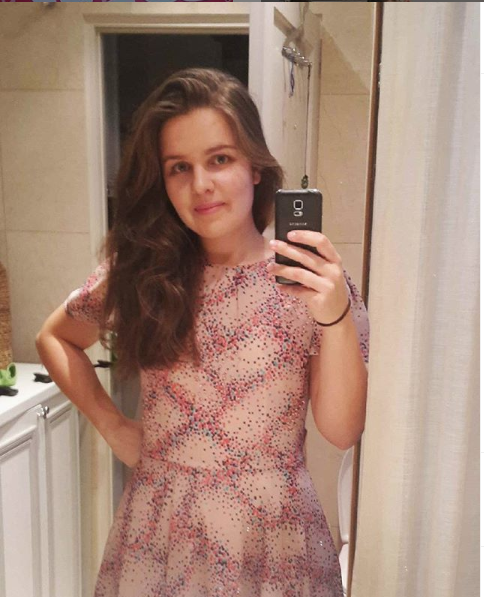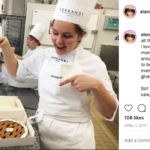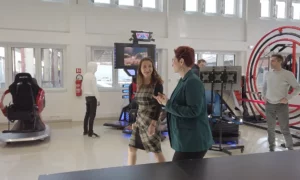At the beginning of February, start-uppers, corporate players, investors, city, county representatives and journalists gathered at ChangeNow, the global positive-impact summit, to discuss concrete actions and innovations to tackle environmental and social challenges. One of the big topics at the summit was FoodTech and the ways the food industry will develop in the future according to customers’ changing habits and the environment.
Follow me on my day full of inspiring pitches, stories and discoveries:
Back to the roots: connecting with nature
Over the past five years, Parisians have displayed a keen interest in urban farming which have kept elevating ever since. The government has equally shown support of such initiatives, with Paris Mayor Ann Hidalgo planning to create 30 hectares of urban agriculture in the city within the next six years. Even though this figure only accounts for 0.3 percent of the city’s land, it could feed up to 11 percent of Paris population.
MERCI RAYMOND
Despite the novelty of urban farming, there are already a few strong players on this market. “It’s true that there is quite a bit of competition and we have to find ways to stand out,” admits Christophe Paquis, a business developer at Merci Raymond, a FoodTech start-up focused on setting up and maintaining urban farms and other green spaces in cities.
Their dream? To help connect citizens and nature in form of a fertile ecosystem, and with 500 projects behind them, the team is ready to move forward and innovate.
A similar desire of making nature closer to Parisians lies in the core of Peas and Love, a young company that plants vegetable and fruit gardens and gives locals access to them. The system works via a monthly subscription which gives the person a possibility to grow and harvest his/her own produce all year round with a caretaker coming regularly to maintain the garden.
The volume of the produce harvested is not the same in December and July. However, the founders say that the payments are equally distributed throughout the year according to what is collected.
Cultivating one’s own food may seem idyllic and almost impossible in the rush of a big city. However such curiosity about nature is definitely something worth applauding.
Consumer awareness: what is on my plate?
In 2020, not only will consumers want to know how many calories or proteins there are in a dish or product, but they will also question the ethical, environmental and social impact of what they purchase. The French are particularly interested in the ways their food is produced, according to Agence Bio, the French agency for the development of bio-organic agriculture.
In 2018 alone, nine out of 10 French people bought produce grown by organic farms and 75 percent of them do it frequently, according to surveys.
The fact that consumers are becoming more and more conscious concerning their nutrition leads to companies investing funds into sourcing the best possible ingredients as well using advanced science to trace actual products back to their true origins.
ORITAIN
One of the FoodTech pioneers of such a traceability method is Oritain, founded in 2008, a New Zealand-based leading global company that scientifically helps companies in textile and food industries build customers’ trust in their products.
The challenge?
It’s “the communication and automatization in countries where the production process is not digitalized (India, Pakistan etc.),” according to Ben Tomkins, Oritain’s business development specialist in the UK office.
GEO FOOTPRINT
A less well-known project, Geo FootPrint, whose pitch I got to hear as a part of the Food and Agriculture start-ups presentation, has a similar aim. This groundbreaking project posts comprehensive data via a publicly available, web-based platform. Its ultimate goal is to implement more effective measurement, monitoring and management of local sustainable agricultural practices globally.
Should such a system be launched in full swing, we will be able to calculate our impact from cultivating certain crops, employing one or another type of fertilizers or using a particular block of land to cultivate food.
The question is, which fraction of the world’s corporations would want to investigate the sourcing of their ingredients and materials and how efficiently the Geo FootPrint platform would reflect the current state of soils around the world, given the amount of information and its’ variability?
Nonetheless, the idea of tracing of sources used in the food industry may lead to new discoveries and, most importantly, give essential information as to how we can minimise the environmental impact on farming.
YUKA
With Oritain and Geo FootPrint mostly aimed at B2B interaction, the Summit also led me to discover a B2C initiative that merits one’s attention – Yuka. Yuka is an app that decrypts the information given on the product label and gives advice on healthier alternatives.
Run as an independent evaluation tool, it analyses the nutritional information given on the packaging and consults a series of governmental bodies to assess the harm caused by additives in the product. Thus, a number from 0 to a 100 is drawn up and healthier options are proposed at the same time.
The next step?
“Users often ask us for more information about additives that fall under the ‘red’ category, i.e. the worst ones among all, so we are working on that. Expansion of our presence on the European market is also underway”, confided Julie Chapon, the co-founder of the app.
To throw away or not to throw away, that is the question
Food waste and its reduction has been a matter of utter importance in European media for the last five years. No wonder, since in 2019 alone, 10 million tons of food was wasted or lost, which accounts for 3 percent of the country’s CO2 emissions.
The government has proclaimed support of food waste reduction via campaigns, laws and regulations to raise awareness of the issue (for example, in a recent law adopted on 30 January 2020, the implementation of a fully functional system of compost collection in private houses as well as in the hotel and the restaurant industry is regarded as a task of utmost importance.
A few of the start-ups whose goal is to find efficient ways of food waste reduction were present at the Summit including Trizzy and UpCycle.
TRIZZY
Imagine an interactive chat bot for a city’s website which will inform you of places to recycle various types of garbage? That’s Trizzy. It is designed “to help cities, towns and villages make recycling efficient and easy for the population by informing them of all the possible solutions to reuse and recycle items and substances,” said Roman Bouillet, CEO and founder of the chat bot.
Tested in a few towns in the south-west of France, the bot is expected to appear on paris.fr, the capital’s official website.
UPCYCLE
A start-up whose idea somewhat coincides with that of Trizzy is UpCycle, which offers a solution to the problem of compost. Having noticed that 50 percent of the cost of managing waste comes from transport, the two founders – Grégoire Bleu and Arnaud Ulrich – entered the market after 2 years of research, trial and error with micro-industrial composters that allow on-site composting of all food waste to produce quality compost.
“We have about 15 machines which are currently being used in restaurants, supermarkets and shops as well as in apartment blocks if the inhabitants wish to install it,” says Camille Doler, the start-up representative at the summit. “Our goal is to install 40 of them by the end of this year.” The composting machine works wonders, transforming any food waste into high-quality soil which can be used by its owners to fertilize their soil or to be given to farmers in the area for free.
Given that on the average 30 percent of our waste is food, here’s to hoping that UpCycle can help alter the existing figures to the better and help us revaluate what we throw away.

About the author:
Elena Kalmykova is a pastry chef, gastronomic guide, arts lover and passionate traveller living in Paris. She’s originally from Moscow, Russia. It was her love for pastry that led Elena to study and then work in a Parisian pastry shop, a 3-star Michelin restaurant and now in a 5-star hotel.
She loves to discover new technologies as well as the latest trends in food, great spots to eat or drink and share her knowledge.
You can follow her on Instagram at elena_kalmykova.
See all of Elena’s Dispatches posts here.
Elena Kalmykova is a pastry chef, gastronomic guide, arts lover and passionate traveller. She’s originally from Moscow, Russia. It was her love for pastry that led Elena to study and then work in a Parisian pastry shop, a 3-star Michelin restaurant, then at a 5-star hotel.
She loves to discover new technologies as well as the latest trends in food, great spots to eat or drink and share her knowledge.
You can follow her on Instagram at elena_kalmykova.















